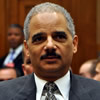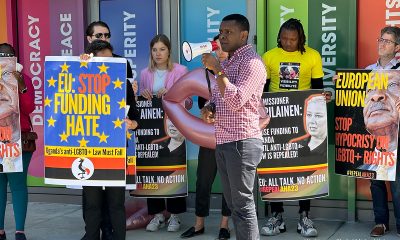National
Court order upholds ban on ‘Don’t Ask’ discharges
But Ninth Circuit allows recruiters to bar open gays from enlisting

A federal appellate court issued an order late Friday prohibiting the U.S. government from discharging additional service members under “Don’t Ask, Don’t Tell” while allowing recruiters to continue to bar openly gay people from enlisting in the armed forces.
The order from the U.S. Ninth Circuit Court of Appeals partially reinstates a stay on an injunction barring the enforcement of “Don’t Ask, Don’t Tell.” The injunction was reissued by the appellate court last week after it was first issued by a U.S. district court last year.
“[T]he stay entered November 1, 2010, is reinstated temporarily in all respects except one,” the order states. “The district court’s judgment shall continue in effect insofar as it enjoins appellants from investigating, penalizing, or discharging anyone from the military pursuant to the Don’t Ask, Don’t Tell policy.”
The decision comes from a three-judge panel within the Ninth Circuit made up of Chief Judge Alex Kozinski and Circuit Judges Kim Wardlow and Richard Paez.
An injunction barring the Pentagon from discharging service members under “Don’t Ask, Don’t Tell” means prohibiting open gays from enlisting in the armed forces is the only part of the law remaining in effect.
The Ninth Circuit partially reinstated the stay upon request from the Obama administration, which on Thursday requested an emergency stay on the injunction that was issued in the case of Log Cabin Republicans v. United States.
The injunction was first put in place last year by U.S. District Court Judge Virginia Phillips last year after she determined that “Don’t Ask, Don’t Tell” was unconstitutional, but only lasted for eight days before the Ninth Circuit placed a stay on the order upon request from the U.S. government. The order from the appellate court last week reversed this decision.
Eileen Lainez, a Pentagon spokesperson, said the Defense Department is “studying the appellate court’s order” with the Justice Department and “will continue to provide guidance to the field as appropriate.”
“The temporary transition that Congress and the President established as a prerequisite to the repeal of [‘Don’t Ask, Don’t Tell’] has been underway for several months and we are nearing presenting certification for decision to the president, the secretary of defense and the chairman of the Joint Chiefs of Staff in the next few weeks,” she added.
A spokesperson for the Justice Department declined to comment.
In a brief filed prior to order coming down from the Ninth Circuit, Log Cabin Republicans asserts the court should keep the injunction in place because U.S. government cannot justify the continued expulsion of service members under “Don’t Ask, Don’t Tell.”
“The parties, and thousands of gay and lesbian servicemembers now serving honorably but in silence, would be left whipsawed, wondering from day to day what the current state of their constitutional rights might be,” the filing states.
Alex Nicholson, executive director of Servicemembers United and sole named veteran plaintiff in the lawsuit, said the Ninth Circuit “did the right thing” in rejecting the U.S. government’s request to reinstate “Don’t Ask, Don’t Tell” in full.
“The situation with finally ending this outdated and discriminatory federal policy has become absolutely ridiculous,” Nicholson said. “This law is unconstitutional on its face, it is virtually dead in practice, and no one should be trying to resuscitate it at this point. The executive branch has been exceptionally unreasonable in the amount of time it has now let the legislative certification process drag out. It is simply not right to put the men and women of our armed forces through this circus any longer.”
Under the repeal law signed in December, “Don’t Ask, Don’t Tell” will be off the books when 60 days pass after the president, the defense secretary and the chair of the Joint Chiefs of Staff certify the U.S. military is ready for open service. Troops have been participating in training since February to prepare for “Don’t Ask, Don’t Tell,” but certification has yet to take place.
The Ninth Circuit says its placing a partial stay on the injunction it previously issued last week because of new information that the U.S. government presented this week in its request for an emergency stay.
The court says it was previously not informed that only one service member had been discharged under “Don’t Ask, Don’t Tell” since the passage of repeal legislation.” Nor did it know that the service chiefs had provided written advice to Pentagon leadership on the status of repeal or that certification is expected to happen “in a matter of weeks, by the end of July or early in August.”
“Appellants acknowledge that they did not previously inform the court of the full extent of the implementation of the Repeal Act,” the court writes.
Additionally, the court directs the U.S. government to provide no later than 5 pm Pacific Time on Monday a supplement brief on why it didn’t present this information in an earlier filing dated May 20.
Plaintiffs have a deadline of Thursday to file an opposition to the U.S. government’s motion for reconsideration on the injunction. The U.S. government has deadline of Friday to respond to that brief.
Expulsions under “Don’t Ask, Don’t Tell” have been virtually nonexistent since the Pentagon instituted new guidance in October raising the discharge authority to the military service secretaries “in coordination” with the under secretary of defense for personnel and readiness and the Pentagon general counsel.
According to the request for an emergency stay issued this week, the Defense Department has only finalized the separation of one service member since the new guidance was put in place.
State Department
State Department releases annual human rights report
Antony Blinken reiterates criticism of Uganda’s Anti-Homosexuality Act

Secretary of State Antony Blinken on Monday once again reiterated his criticism of Uganda’s Anti-Homosexuality Act upon release of the State Department’s annual human rights report.
“This year’s report also captures human rights abuses against members of vulnerable communities,” he told reporters. “In Afghanistan, the Taliban have limited work opportunities for women, shuttered institutions found educating girls, and increasing floggings for women and men accused of, quote, ‘immoral behavior,’ end quote. Uganda passed a draconian and discriminatory Anti-Homosexuality Act, threatening LGBTQI+ individuals with life imprisonment, even death, simply for being with the person they loved.”
Ugandan President Yoweri Museveni last May signed the law, which contains a death penalty provision for “aggravated homosexuality.”
The U.S. subsequently imposed visa restrictions on Ugandan officials and removed the country from a program that allows sub-Saharan African countries to trade duty-free with the U.S. The World Bank Group also announced the suspension of new loans to Uganda.
Uganda’s Constitutional Court earlier this month refused to “nullify the Anti-Homosexuality Act in its totality.” More than a dozen Ugandan LGBTQ activists have appealed the ruling.
Clare Byarugaba of Chapter Four Uganda, a Ugandan LGBTQ rights group, on Monday met with National Security Council Chief-of-Staff Curtis Ried. Jay Gilliam, the senior LGBTQI+ coordinator for the U.S. Agency for International Development, in February traveled to Uganda and met with LGBTQ activists who discussed the Anti-Homosexuality Act’s impact.
“LGBTQI+ activists reported police arrested numerous individuals on the basis of their sexual orientation or gender identity and subjected many to forced anal exams, a medically discredited practice with no evidentiary value that was considered a form of cruel, inhuman, and degrading treatment and could amount to torture,” reads the human rights report.
The report, among other things, also notes Ugandan human rights activists “reported numerous instances of state and non-state actor violence and harassment against LGBTQI+ persons and noted authorities did not adequately investigate the cases.”
Report highlights anti-LGBTQ crackdowns in Ghana, Hungary, Russia
Ghanaian lawmakers on Feb. 28 approved the Promotion of Proper Human Sexual Rights and Ghanaian Family Values Bill. The country’s president, Nana Akufo-Addo, has said he will not sign the measure until the Ghanaian Supreme Court rules on whether it is constitutional or not.
The human rights report notes “laws criminalizing consensual same-sex sexual conduct between adults” and “crimes involving violence or threats of violence targeting lesbian, gay, bisexual, transgender, queer or intersex persons” are among the “significant human rights issues” in Ghana.
The report documents Hungarian Prime Minister Viktor Orbán and members of his right-wing Fidesz party’s continued rhetoric against “gender ideology.” It also notes Russia’s ongoing crackdown against LGBTQ people that includes reports of “state actors committed violence against LGBTQI+ individuals based on their sexual orientation or gender identity, particularly in Chechnya.”
The report specifically notes Russian President Vladimir Putin on July 24 signed a law that bans “legal gender recognition, medical interventions aimed at changing the sex of a person, and gender-affirming care.” It also points out Papua New Guinea is among the countries in which consensual same-sex sexual relations remain criminalized.

The Cook Islands and Mauritius in decriminalized homosexuality in 2023.
The report notes the Namibia Supreme Court last May ruled the country must recognize same-sex marriages legally performed outside the country. The report also highlights the Indian Supreme Court’s ruling against marriage equality that it issued last October. (It later announced it would consider an appeal of the decision.)
Congress requires the State Department to release a human rights report each year.
The Biden-Harris administration in 2021 released a memorandum that committed the U.S. to promoting LGBTQ+ and intersex rights abroad.
The full report can be read here.
National
Same-sex couples vulnerable to adverse effects of climate change
Williams Institute report based on Census, federal agencies

A new report by the Williams Institute at the UCLA School of Law finds that same-sex couples are at greater risk of experiencing the adverse effects of climate change compared to different-sex couples.
LGBTQ people in same-sex couple households disproportionately live in coastal areas and cities and areas with poorer infrastructure and less access to resources, making them more vulnerable to climate hazards.
Using U.S. Census data and climate risk assessment data from NASA and the Federal Emergency Management Agency, researchers conducted a geographic analysis to assess the climate risk impacting same-sex couples. NASA’s risk assessment focuses on changes to meteorological patterns, infrastructure and built environment, and the presence of at-risk populations. FEMA’s assessment focuses on changes in the occurrence of severe weather events, accounting for at-risk populations, the availability of services, and access to resources.
Results show counties with a higher proportion of same-sex couples are, on average, at increased risk from environmental, infrastructure, and social vulnerabilities due to climate change.
“Given the disparate impact of climate change on LGBTQ populations, climate change policies, including disaster preparedness, response, and recovery plans, must address the specific needs and vulnerabilities facing LGBTQ people,” said study co-author Ari Shaw, senior fellow and director of international programs at the Williams Institute. “Policies should focus on mitigating discriminatory housing and urban development practices, making shelters safe spaces for LGBT people, and ensuring that relief aid reaches displaced LGBTQ individuals and families.”
“Factors underlying the geographic vulnerability are crucial to understanding why same-sex couples are threatened by climate change and whether the findings in our study apply to the broader LGBTQ population,” said study co-author Lindsay Mahowald, research data analyst at the Williams Institute. “More research is needed to examine how disparities in housing, employment, and health care among LGBT people compound the geographic vulnerabilities to climate change.”
Read the report
Federal Government
Lambda Legal praises Biden-Harris administration’s finalized Title IX regulations
New rules to take effect Aug. 1

The Biden-Harris administration’s revised Title IX policy “protects LGBTQ+ students from discrimination and other abuse,” Lambda Legal said in a statement praising the U.S. Department of Education’s issuance of the final rule on Friday.
Slated to take effect on Aug. 1, the new regulations constitute an expansion of the 1972 Title IX civil rights law, which prohibits sex-based discrimination in education programs that receive federal funding.
Pursuant to the U.S. Supreme Court’s ruling in the landmark 2020 Bostock v. Clayton County case, the department’s revised policy clarifies that discrimination on the basis of sexual orientation and gender identity constitutes sex-based discrimination as defined under the law.
“These regulations make it crystal clear that everyone can access schools that are safe, welcoming and that respect their rights,” Education Secretary Miguel Cardona said during a call with reporters on Thursday.
While the new rule does not provide guidance on whether schools must allow transgender students to play on sports teams corresponding with their gender identity to comply with Title IX, the question is addressed in a separate rule proposed by the agency in April.
The administration’s new policy also reverses some Trump-era Title IX rules governing how schools must respond to reports of sexual harassment and sexual assault, which were widely seen as imbalanced in favor of the accused.
Jennifer Klein, the director of the White House Gender Policy Council, said during Thursday’s call that the department sought to strike a balance with respect to these issues, “reaffirming our longstanding commitment to fundamental fairness.”
“We applaud the Biden administration’s action to rescind the legally unsound, cruel, and dangerous sexual harassment and assault rule of the previous administration,” Lambda Legal Nonbinary and Transgender Rights Project Director Sasha Buchert said in the group’s statement on Friday.
“Today’s rule instead appropriately underscores that Title IX’s civil rights protections clearly cover LGBTQ+ students, as well as survivors and pregnant and parenting students across race and gender identity,” she said. “Schools must be places where students can learn and thrive free of harassment, discrimination, and other abuse.”
-

 South America3 days ago
South America3 days agoDaniel Zamudio murderer’s parole request denied
-

 Maryland4 days ago
Maryland4 days agoMontgomery County police chief discusses arrest of trans student charged with planned school shooting
-

 Commentary4 days ago
Commentary4 days agoWorld ‘isn’t much different today’
-

 European Union5 days ago
European Union5 days agoActivists demand EU sanction Uganda over Anti-Homosexuality Act












